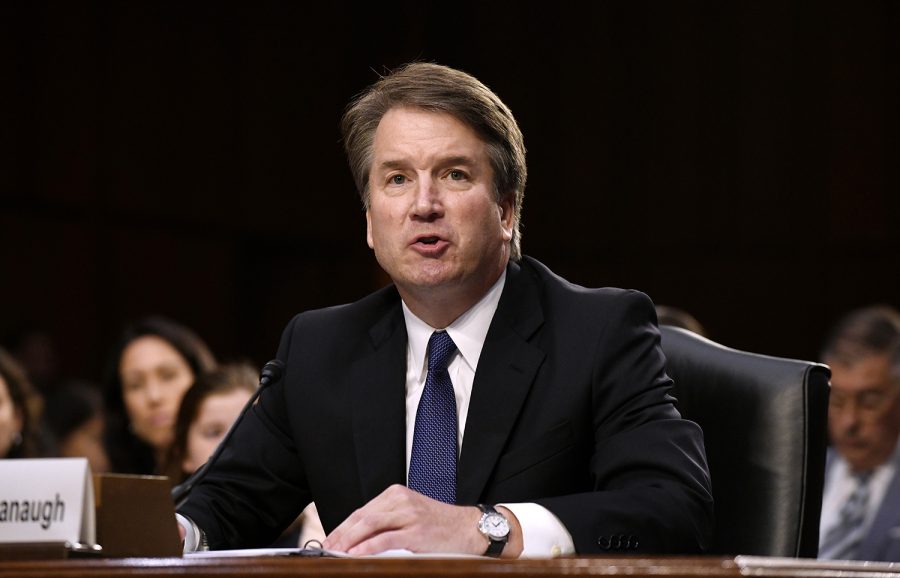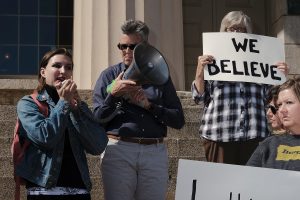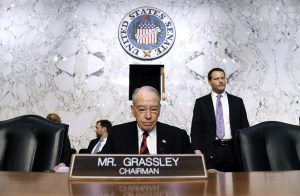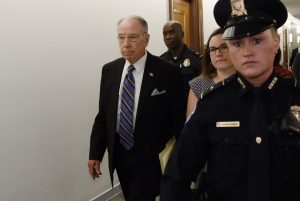Iowa law professors voice opposition to Kavanaugh’s Supreme Court confirmation
Ten law professors from Iowa opposed Kavanaugh’s confirmation based on his combative testimony Sept. 27, signing onto a letter signed by more than 2,400 legal scholars that was sent to the Senate Thursday.
Supreme Court nominee Brett Kavanaugh testifies at his confirmation hearing in the Senate Judiciary Committee on Capitol Hill Sept. 4, 2018 in Washington, D.C. (Olivier Douliery/Abaca Press/TNS)
October 6, 2018
The U.S. Senate voted Saturday afternoon to confirm embattled Supreme Court Nominee Brett Kavanaugh after an extra two weeks of hearings that have left some law professors in Iowa uneasy with Kavanaugh’s temperament.
Ten professors from Iowa’s two law schools signed onto a letter published in the New York Times alongside more than 2,400 other legal scholars opposing Kavanaugh’s confirmation to the bench. The letter criticized Kavanaugh’s temperament during questioning about Ford’s allegations.
“We have differing views about the other qualifications of Judge Kavanaugh,” the letter read. “But we are united, as professors of law and scholars of judicial institutions, in believing that he did not display the impartiality and judicial temperament requisite to sit on the highest court of our land.”
Last week, Iowa’s senior senator, Chuck Grassley, a Republican from New Hartford and chair of the Senate Judiciary Committee, opened a second round of hearings for Kavanaugh. This time the committee and the nation heard allegations of sexual assault from California professor Christine Blasey Ford and Kavanaugh’s response.
In testimony to the committee, Kavanaugh defended his judicial record and categorically denied the allegations with strong emotion, at times tearing up and firing questions back at senators.
“I had serious concerns about Judge Kavanaugh’s demeanor,” said Andrew Jurs, associate dean and law professor at Drake University Law School, after watching the hearings. Jurs was one of the professors who signed onto the letter. “I don’t believe Judge Kavanaugh’s temperament is consistent with someone who has the honor to serve on the Supreme Court.”
Drake University law professor Sally Frank, who signed the letter, said she had opposed Kavanaugh even before the hearings based on his judicial philosophy, but was more invigorated since. Because senators confirmed Kavanaugh to the court, she hoped the public would take action in future elections.
“I hope people vote,” Frank said. “I hope people vote anyway, but unfortunately for Iowans, we can’t vote against the senators responsible for this [this year].”
The letter specifically referenced a period during Kavanaugh’s opening statements Sept. 27 when he called the hearings “a calculated and orchestrated political hit.”
“… Fueled with apparent pent-up anger about President Trump and the 2016 election,” Kavanaugh said. “Fear that has been unfairly stoked about my judicial record. Revenge on behalf of the Clintons and millions of dollars in money from outside left-wing opposition groups.”
RELATED: Grassley confident in Kavanaugh confirmation
University of Iowa law professor Paul Gowder, who signed onto the letter, said he was surprised when he heard the testimony from Kavanaugh.
“I never thought I would see the day when a nominee for the Supreme Court would yell at the Senate, and accuse the minority party of being involved in some kind of revenge conspiracy on behalf of the Clintons,” Gowder said.
Kavanaugh defended his actions, citing his previous 12 years as a District Court Judge in an op-ed published in the Wall Street Journal Friday. He said his emotion was fueled by defending himself as a father and as a son.
But, he commented, “I might have been too emotional at times. I know that my tone was sharp, and I said a few things I should not have said.”
“People who are subject to such serious allegations are often upset, and asking them to remain civil in response is a big ask,” Gowder said. “But we make a lot of big asks of judges. Judges are not entitled to react like normal people. They’re not entitled to be partisan like normal people. They play a special role in our legal system and occupy a special position of trust.”
T.B. Elias Bram, clinical associate professor of law at the UI College of Law, noted the letter’s reference to two statutes regarding bias and recusal concerning judges.
“Anytime when a judge’s impartiality is questioned, that judge has to disqualify him or herself in the case,” he said. “… Judge Kavanaugh was so upset he was not thinking of his appearance.”







